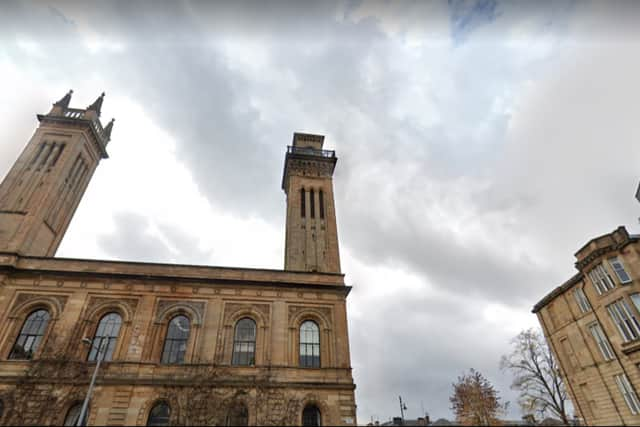Park Residents Action Group liken Trinity Tower evacuation to Art School fire ‘mistakes’
and live on Freeview channel 276
Residents living in the vicinity of Trinity Tower, in the Park district, were evacuated from their homes on January 29, after high winds brought by Storm Malik led to fears that the structure could collapse.
The building had been undergoing structural repairs at the time - and the deterioration had been exacerbated by the strong winds. An exclusion zone was set up around the tower, preventing people from accessing their properties, which can’t be removed until “adequate stabilisation work” is complete.


Advertisement
Hide AdAdvertisement
Hide AdFollowing the evacuation, it was reported that repairs to make the tower stable could ‘take up to three months’.
In a letter to residents, the council added this is currently an estimate as investigations and design work are “at an early stage.”
Now the Park Residents Action Group have come out in criticism of the council’s handling of the situation, as they say that residents have been told that the 900 ton structure remains at high risk of ‘uncontrolled collapse’, yet the tower is still unsecured. They also claim that Glasgow City Council have failed to meet with residents or share a clear plan of action.
A spokesperson for the group said: “Six weeks on residents are still prevented from returning to their homes. GCC say the building still poses a risk to life but will not release any Engineering reports or provide any plan of action for its stabilisation or controlled dismantling.
Advertisement
Hide AdAdvertisement
Hide Ad“Another Glasgow landmark, a prominent feature of our city’s skyline and an ‘A’ listed building may be lost forever. Meanwhile people’s lives have been turned upside down and are faced with a blank refusal to requests to return to their homes, even briefly, to gather essential items, personal documents or medicines.
“The Parliamentary report on the last fire at Glasgow School of Art of June 2019 severely criticised the GCC response to that evacuation, the sense of abandonment for residents and the lack of a coherent, joined up plan. They were told ‘lessons must be learned’.
“Serious questions need to be asked as to whether Glasgow City Council will ever learn lessons from previous disasters and whether its current leadership place any value on the cities architectural heritage or the lives of the citizens that live within it.”
Resident Keith McIvor of Optimo Music explained that the evacuation means he faces uncertainty over work, saying: “After two years of not being able to work due to the pandemic, I now face continued uncertainty due to having no access at all to my music collection or studio equipment, both of which are essential for me to be able to work”.
Advertisement
Hide AdAdvertisement
Hide AdPaul Sweeney MSP said: “Having discussed the situation with residents of the buildings contained in the Trinity Tower exclusion zone, I am in no way surprised that they are growing increasingly frustrated with the lack of progress or meaningful proposals from Glasgow City Council.
“The safety of residents is of paramount importance and the council had no option other than to evacuate six weeks ago, but that does not excuse the lack of progress made since. In situations like these, it is important that we all remember these are not just buildings, but people’s homes and the disruption the residents are facing is colossal.
“Astonishingly we are now at the stage where residents are being displaced for unspecified lengths of time while the structure apparently remains at high risk of uncontrolled collapse. If that is the case, why are Glasgow City Council in dispute with engineers appointed by the factors and owners rather than acting urgently to get the repairs underway and the exclusion zone reduced so residents can return home?
“I have written to both the council and Scottish Ministers on the behalf of residents, but the responses have been far from encouraging and it’s clear that more needs to be done immediately. If needs be, the Scottish Government should be involved to expedite repairs and provide the funding to do so if finances are a sticking point.”
Advertisement
Hide AdAdvertisement
Hide AdA Glasgow City Council spokesman said: “We have communicated regularly with residents affected by the exclusion zone around this dangerous building, and will continue to do so whenever we have information we can provide an update on.
“We absolutely understand how difficult it is for people to be out of their homes for an extended period and how important it is for them to receive information, and it should be understood that the timescale of 2-3 months was given by the owners’ contractor once they had confirmed the works they would have to carry out to make the building safe.
“We relayed this information to affected residents, and continue to work with the contractors to ensure people can return home as quickly as possible.
“Council tax will not be paid by residents during the period they are out of their properties. Residents have been given (risk-assessed) access to collect essential items.
Advertisement
Hide AdAdvertisement
Hide Ad“The condition and maintenance of the Trinity tower is a matter for the owners, and work instructed by them was already underway when our Building Standards team was alerted by their contractors, who were concerned about its condition.”
Designed by Charles Wilson, Trinity College dates back to 1856 and was initially opened as the Free Church College.
Comment Guidelines
National World encourages reader discussion on our stories. User feedback, insights and back-and-forth exchanges add a rich layer of context to reporting. Please review our Community Guidelines before commenting.